Table of Contents
Do you workout regularly in the evening? In that case, you are probably also in a dilemma whether it’s a good idea to eat after your workout or whether you’d rather stick it out until breakfast. You may have thoughts like “I’m going to gain weight from this”, “it’ll get stored in my fat” or “it’s long past 6 o’clock, I can’t eat anymore” while looking at your late dinner. In that case, this article is specifically for you.
A meal after a workout, also known as a post-workout meal, is still a hot topic. You know it’s important for recovery and muscle growth. It also plays an important role in whether you will be successful on your way to your dream physique. Both in building muscle and losing weight. However, evening workouts spoil this ideal a little bit, because they go against the idea that you shouldn’t eat in the evening anymore. So what’s the story? Can you eat without regrets even after an evening workout?
In this article you will find tips for these post-workout meals prior to bedtime:
Why eat after working out?
Do you look forward to a tasty meal waiting for you at home after a strenuous workout? No wonder, because after a hard workout you get really hungry. But don’t forget that a post-workout meal isn’t just a post-workout treat for you after you’ve given it your all.
First of all, it will help your body regenerate efficiently, gain new strength and prepare for your next peak performance in the best possible condition. During workouts, various changes occur in the body, for example, gradual depletion of energy reserves or damage to muscle tissues. Consequently, your body needs the right nutrition to repair the muscles damaged by exercising. It also requires the replenishment of glycogen stores, i.e. the reserves of carbohydrates that are stored in the muscles and provide them with energy during sporting activity. Therefore, it is necessary to take in nutrients in the post-workout meal to help focus on these processes. [2]
In today’s article we will be focusing on nutrition after an evening workout. However, if you are generally interested in how to put together a post-workout meal, feel free to read our articles What to Eat After Training? The Best Meals and Supplements for Bodybuilders or Endurance Athletes.

Can you eat after an evening workout?
You may still come across the recommendation that it is ideal to skip dinner, because it makes you fat and food eaten after 6 pm is automatically stored as fat. In reality, however, body fat is only gained in one and only one case, and that is when you are in a calorie surplus. If the total daily energy intake is higher than energy expenditure for a long period of time, the body stores this surplus as fat.
Therefore, as long as your daily calorie intake does not exceed your calorie expenditure, you can have a meal at 10 pm without worrying about gaining weight. Therefore, if you come back from a workout late, you don’t have to worry about hunger, and this is also true for weight loss. But you still think it’s safer to stick it out until the morning? In that case, remember that if you want to get results, a quality post-workout meal is a must, and for evening workouts this doubly applies.
It is followed by night, i.e. a long period of fasting, during which you should not leave your tired muscles without a supply of quality nutrients. However, as we have already said, if you eat, your body will use them preferably to regenerate muscles damaged by the workout and to replenish depleted glycogen. An evening post-workout meal definitely has its place of honour in your diet.
You might be interested in these products:
Benefits of an evening post-workout meal
1. Promotes muscle recovery and maintenance
Any properly structured post-workout meal with an good dose of protein can help stop muscle breakdown after a hard workout. Muscles are made up of muscle proteins, which are damaged after exercise and break down (catabolism). By consuming protein from a post-workout meal, you’re trying to stimulate the body’s anabolic processes, i.e. those in which muscle mass is in turn created and renewed. A sufficient dose of protein in a post-workout meal thus helps to regenerate and rebuild muscles damaged by working out. [6]
2. Increases muscle protein synthesis and muscle growth
Thanks to a post-workout meal rich in protein, you can not only maintain muscle mass, but also build it. This way, you provide your body with the building material for the formation of new muscles. Although the body works to grow them throughout the day and draws on your total daily protein intake, the post-workout portion is especially important.
Today’s recommendations suggest that for the best support of muscle growth, you should consume protein within 2 hours of your workout. The evening post-workout meal is such an important part of the journey to the physique you’ve been working so hard to achieve. If you skip it, you’ll go through the night and easily go more than ten hours without eating, which certainly won’t benefit your workout-exhausted muscles. [7]
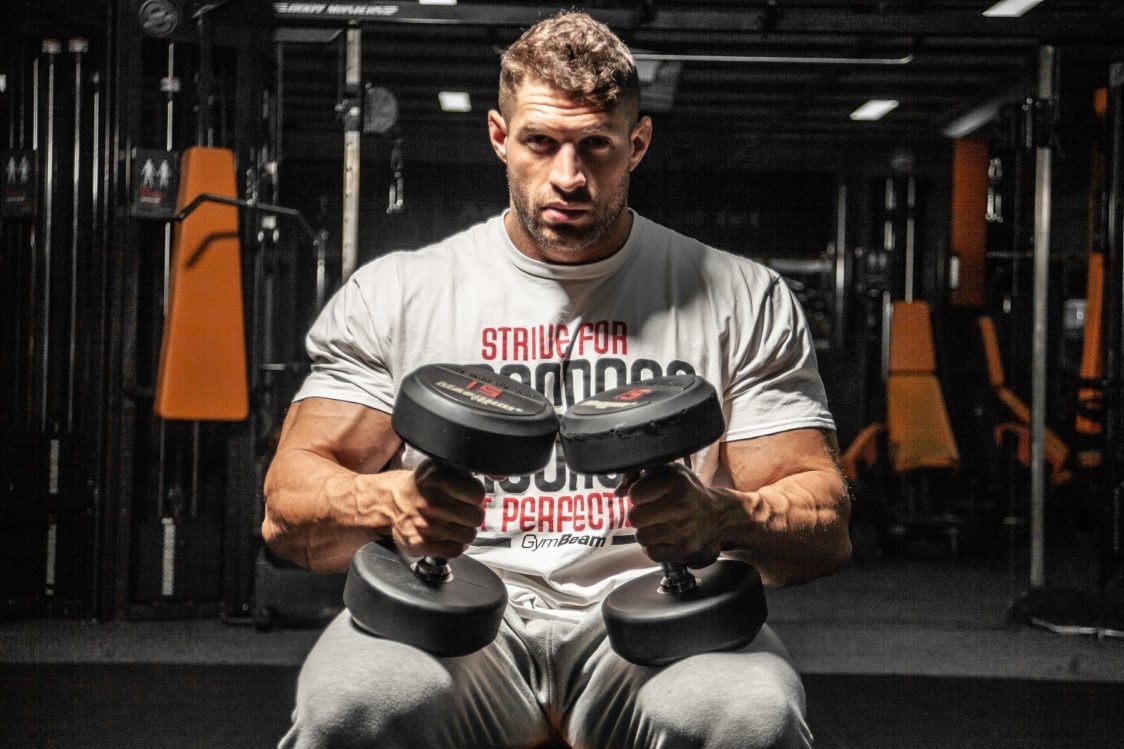
3. Restores glycogen reserves
The body uses stored carbohydrates in the form of muscle glycogen to replenish energy during a workout. However, after a workout, especially an intense and demanding one, these stores are depleted, so it’s time to replenish them. That’s why you need a post-workout meal with a sufficient dose of carbohydrates. These will help to rebuild glycogen stores and prepare your muscles for the next workout, especially when you have a workout first thing in the morning after waking up. [7]
Discover our bestsellers:
What should be included and avoided in your evening post-workout meal?
The main goal of a post-workout meal is to provide the body with all the necessary macro- and micronutrients in the right amounts and proportions so that it can recover after a workout. Of course, this applies to post-workout nutrition at any time of the day, but the one in the evening has its own specifics.
You have to think especially about the fact that it is a meal just before bedtime. And since sleep is just as important for health and recovery as is diet, you certainly don’t want to disrupt it. This could be caused, for example, by digesting a large and heavy meal. That’s why it’s important to make your meal lighter after a late workout, and if your body requires it, smaller. You’ll recognise that having a big burger with roasted potatoes before bed is not the best idea in the same way that having a hearty spicy Asian delight, for example, is not the best idea.
At the same time, make sure that your post-workout serving matches the intensity of your workout. There’s a difference between an intense hour-long workout, in which one personal best after another is set, and a relaxing yoga class.
A complex post-workout meal, even an evening one, should contain protein, carbohydrates, fats, fibre, as well as plenty of vitamins and minerals. First and foremost, we emphasise getting sufficient protein. Other nutrients are also certainly important to include, but their amount is more flexible. It may depend more on the total daily intake of these substances or on how efficient your digestive system is in the evening and at night. In doing so, don’t forget to drink to replenish the fluids lost during your workout through perspiration.
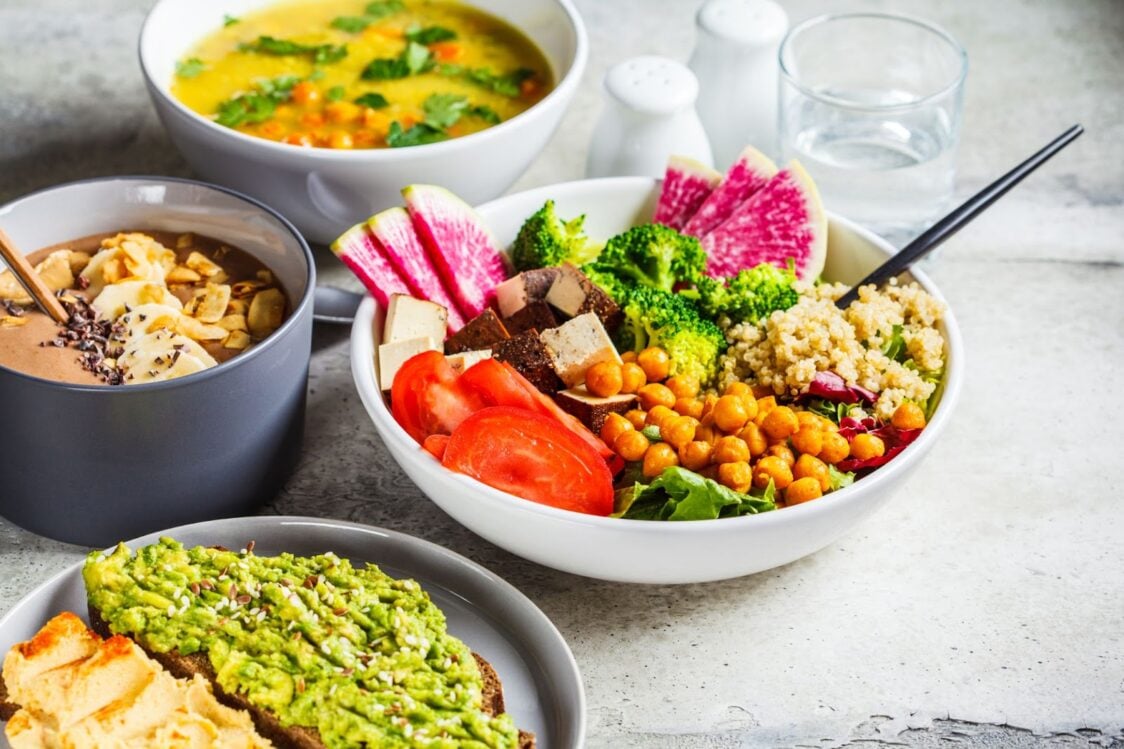
Protein
- Main function: play a role in the repair and regeneration of muscles damaged by the workout. They are also the material for the growth and development of new muscle mass.
- Recommended amount: current recommendations suggest that you should consume 20 – 40 g of protein in your post-workout meal to best support muscle protein synthesis (MPS). However, your total daily protein intake is particularly important. This should be in the range of 1.4 – 2 g/kg body weight for athletes and active people. The exact values depend on the intensity of your physical activity and lifestyle. In the case of weight loss or maximising muscle growth, the appropriate dose may be even higher, up to 2.4 g/kg BW. [7]
Suitable post-workout protein sources
After a workout, you should reach for a quality protein with a high biological value. Which are they?
- Lean meat, fish, plant-based meat alternatives (tofu, robi, seitan), dairy products, eggs, protein in the form of supplements – whey protein, plant-based protein, casein
Unsuitable post-workout protein sources
In particular, avoid protein foods with a high fat content.
- fatty meats, fatty cured meats (salami, sausages), offal or, for example, fried meats.
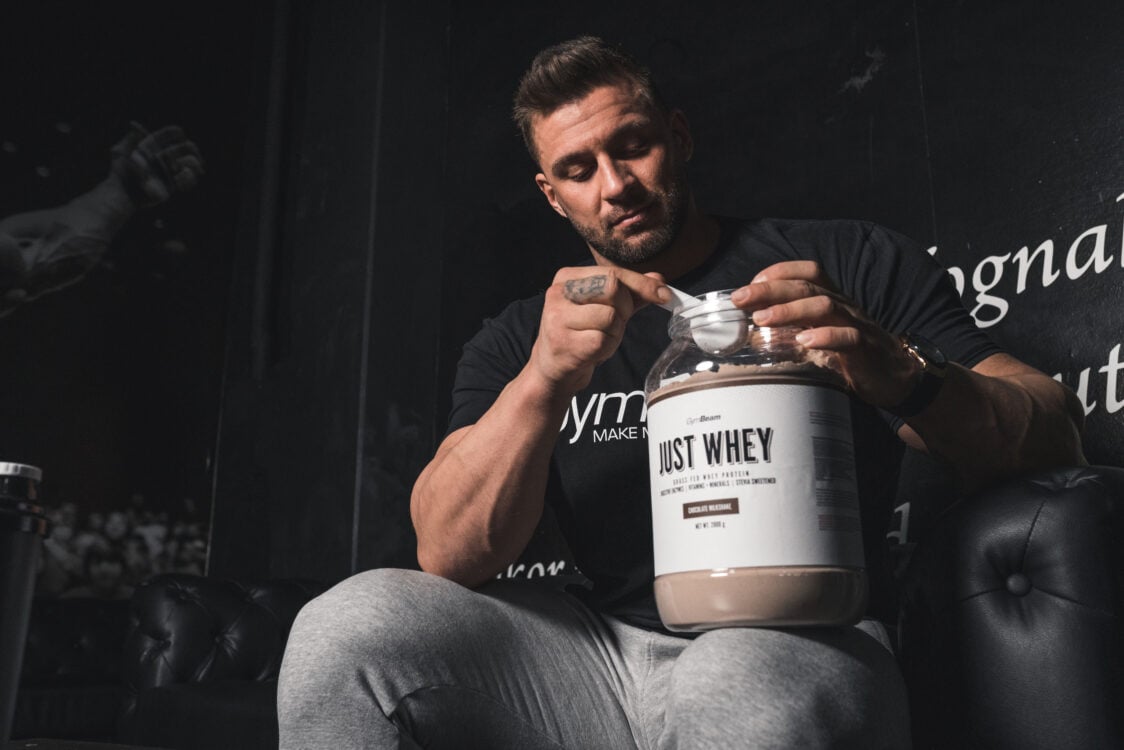
Fats
- Main function: serves essentially as a source of energy for the body.
- Recommended amount: fat is an important component of a complex meal, but you shouldn’t overdo it in a post-workout meal. It is digested more slowly than protein and carbohydrates and can slow down absorption. However, after a workout, you want to replenish these nutrients as quickly as possible. The optimal amount of fat in a post-workout meal is therefore in the range of 10 – 20 g. At the same time, fat in the diet should make up 30% of the total daily energy intake. This represents 300 kcal, or about 67 g of fat, for a reference intake of 2000 kcal.[9]
Suitable sources of fat after working out
In particular, add plant sources of fat to your meals that contain healthy monounsaturated and polyunsaturated fatty acids.
- These include for example vegetable oils, nuts, seeds, nut butters or avocados.
- All animal foods (meat, dairy products, eggs, etc.) naturally contain fat. This fat is also okay and has a place in your diet.
Unsuitable sources of fat after a workout
After an evening workout, you should ideally avoid foods with excessive amounts of fat. These include the following.
- fatty meats and cold cuts, fried foods or heavier dishes with sauces, desserts, sweets and confectionery
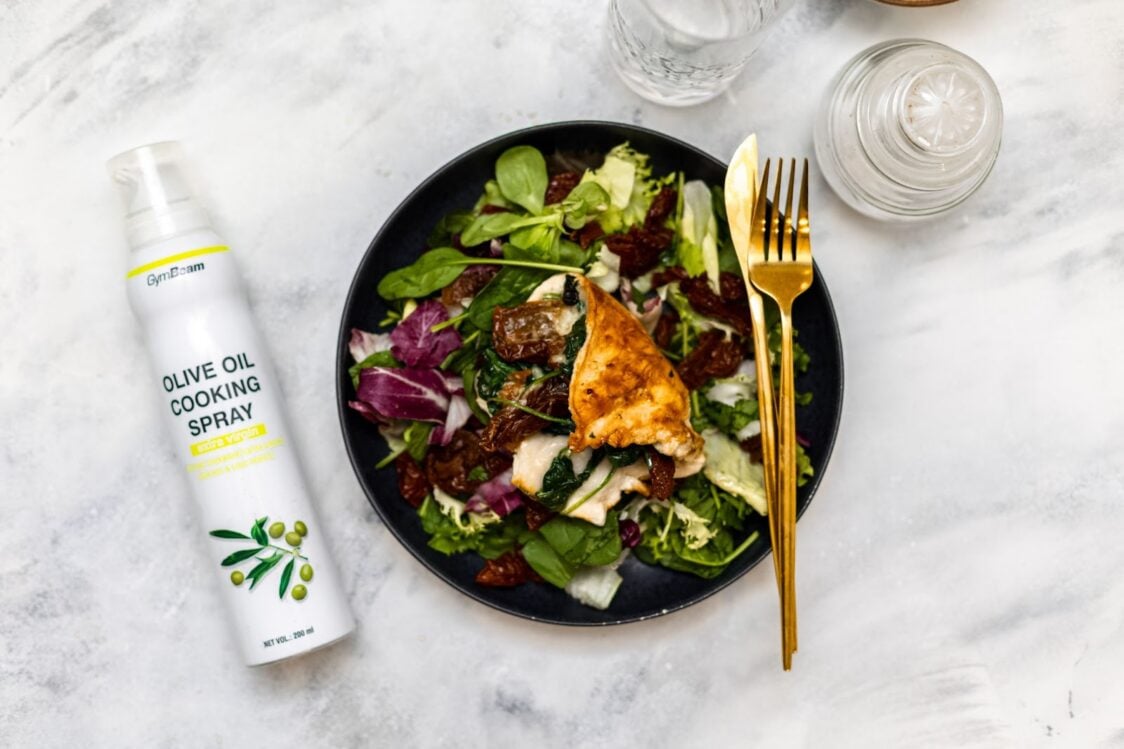
Carbohydrates
- Main function: they are important for replenishing depleted glycogen stores and serve as an energy source for the body. [8]
- Recommended amount: the recommendations for post-workout carbohydrate intake apply mainly to professional athletes, who systematically replenish carbohydrate stores gradually, even several hours after training. However, there is no specific recommendation for recreational athletes. However, it can be said from available sources that an intake of 0.5-1.2 g/kg BW may be optimal. The specific amount depends on the intensity of the workout or your goals. [7]
Suitable carbohydrate sources after working out
After an evening workout, it’s ideal to treat your body to complex carbohydrates that are digested and absorbed into the blood slowly and gradually. As a result, they help keep you feeling fuller for longer, plus they don’t cause a spike in blood sugar levels. What can you choose from?
- potatoes, sweet potatoes, rice, buckwheat, quinoa, pasta, including couscous, bulgur, oatmeal, porridge, bread, tortilla
Unsuitable carbohydrate sources after working out
Ideally, avoid sugary foods and foods full of especially simple sugars. Not only are these meals and foods often poor in protein, but they are also digested quickly and can spike blood sugar levels. In the evening, on the other hand, it is more beneficial for your digestive system to process food more slowly so that you are able to maintain a stable glycaemia throughout the night.
- Omit sweets, desserts, sweet pastries, sweet foods such as pancakes with Nutella, etc.
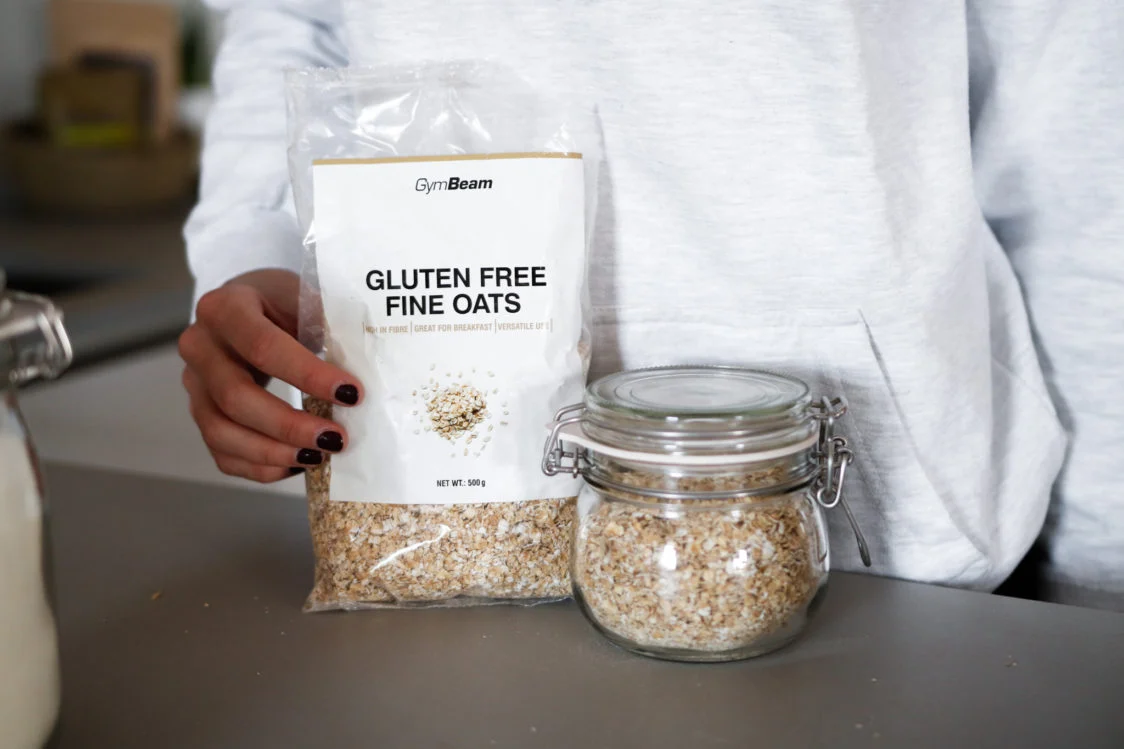
Diet post an evening workout for weight loss
As we’ve already said, you don’t have to worry about being hungry in the evening even if you’re trying to lose weight. On the contrary, your body will thank you for your evening post-workout meal. Not only can it help you recover better and gather strength for your next personal best during your workout, but it also prevents you from losing muscle. During weight loss, when you are in a calorie deficit, the body is more prone to catabolism of muscle proteins and loss of muscle mass. However, this is something you should try to avoid at all costs. A quality post-workout meal rich in protein is invaluable in this endeavour. [3]
What’s more, when you eat in the evening, there’s less chance of a ravenous hunger attack the next day that makes you want to clean out the fridge. In short, a full evening meal will help induce better satiety and hunger control.[4]
However, if you want to reap these benefits from post-workout meals while shedding kilos, you obviously need to maintain a calorie deficit. Thus, the amount of calories at dinner must fit into your total daily energy intake, which you must take in for weight loss. In that case, you won’t even mind enjoying a generous serving of carbohydrates after the magical hour of six in the evening, when many people have already cut out carbohydrates. On the contrary, your body will be delighted to have the opportunity to rebuild glycogen stores.
If you are interested in a more detailed description of what to do to lose weight successfully, read our article The Simple Basics of Weight Loss: You’ll Be Surprised What’s Really Important.

A meal post an evening workout for muscle gain
If you want to build muscle, you should do your best to promote proteosynthesis, or the production of muscle protein, as much as possible. Conversely, it is also important to avoid muscle burning, i.e. catabolism. Of course, in order to form new muscle mass, the body needs to be in a calorie surplus, i.e. taking in more energy than it puts out.
A post-workout meal will effectively replenish both the energy and protein you need. However, current scientific sources tell us that it’s not so important to pander to the anabolic window and throw in some protein right after your workout. First and foremost, it’s essential to get sufficient protein throughout the day. As for a post-workout meal, it’s ideal to have it 3-4 hours after your pre-workout meal. This roughly corresponds to the recommendation we mentioned earlier today that the post-workout meal should be eaten within 2 hours of a workout. [1,5]
If you want to know more about how to build muscle effectively, don’t miss our article What to Eat and How to Workout to Finally Gain Muscle?
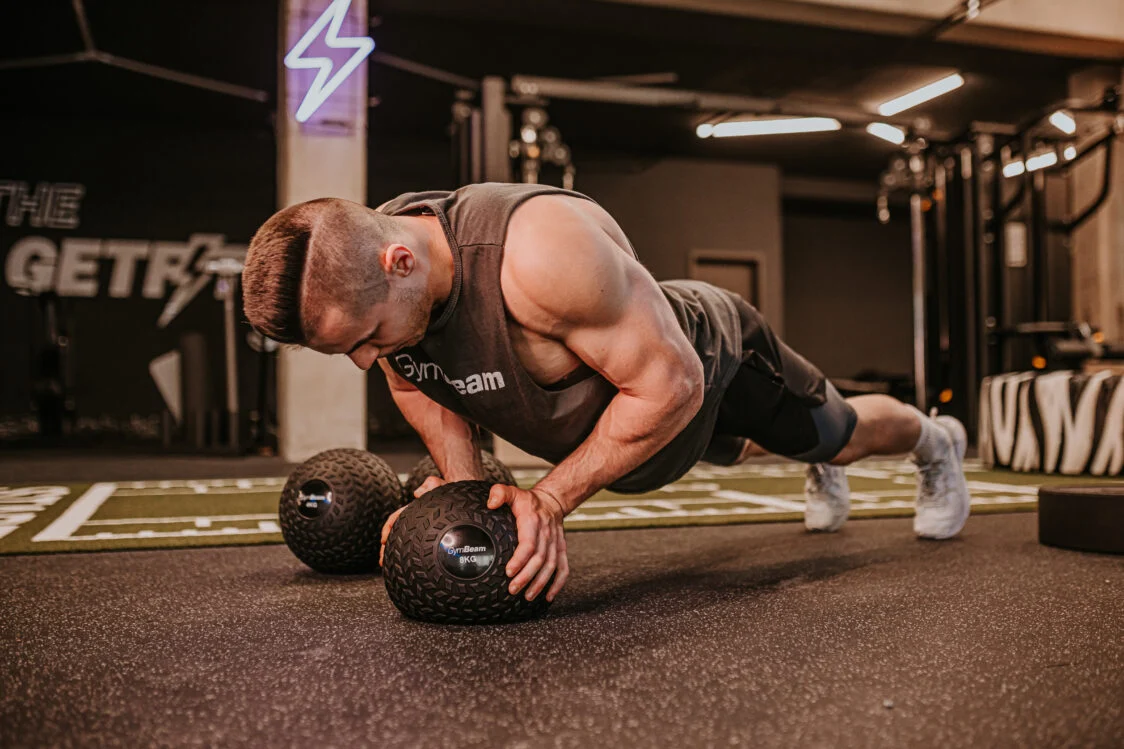
How to plan the timing of an evening post-workout meal?
The timing of your meal after an evening workout should ideally be guided by two factors – the workout itself and sleep. After all, you need to get some food in you to nourish your body after a hard workout. On the other hand, however, dinner time should also be governed by the time of evening it is. In fact, eating just before going to bed can interfere with your quality of sleep. How to get out of this?
- Have your post-workout meal ideally within about two hours after your workout.
- You can either eat on the way home from the gym or in peace when you get home.
- How quickly you should eat your meal depends on when you go to bed.
- Recommendations suggest that ideally you should eat your last meal two hours before bedtime. However, it also depends on how you tolerate food at this time. So it may be perfectly fine to have a lighter snack even an hour before bedtime.
- If you have the luxury of time, treat yourself to a full dinner no more than the aforementioned two hours before you go to bed.
- If you’re pressed for time, eat straight after your workout or have a smaller, protein-rich meal an hour before bedtime.
- In any case, keep in mind that it is important to eat after a workout and not go to bed with a rumbling stomach.
Tips for meals after an evening workout
Preparing a post-workout meal doesn’t have to be rocket science. You can indulge in both simple and more elaborate dishes, and it’s up to you whether you enjoy some sweet or savoury goodness. However, always ensure that your meal is tailored to your total daily energy intake and contains all the important nutrients.
If you’re pressed for time after an evening workout, it can help to prepare your post-workout meal ahead of time, for example, as part of your meal prep for the next few days. It can also help to stock up on simple snacks that don’t take a lot of time to prepare, yet still effectively serve their purpose.
1. Open sandwich
Bread, ideally wholegrain, is a great source of complex carbohydrates and fibre. You can go for wholemeal bread, rolls, baguettes or even toast to make a tasty sandwich.
Be inspired:
- rye bread with fresh cheese spread, slices of ham and hard cheese with 30% fat, a portion of tomatoes or other vegetables
- wholegrain toast with butter, slices of smoked tofu and pieces of hard-boiled egg, red pepper or other vegetables
- baguette with ricotta and slices of smoked salmon, radishes or a serving of other vegetables
2. Bread with a spread
Tired of eating ham and cheese sandwiches all the time? Then tasty spreads are perfect for you. There are no limits to your imagination, since you can use vegetables, legumes, fish, eggs or tofu in them. When you include spreads in your diet, dinner sandwiches don’t have to be boring anymore.
Take inspiration from our recipes:
- Vegan tofu and sun-dried tomato spread
- Chickpea and bean legume spread
- Tuna spread with egg
- Beetroot and cottage cheese spread
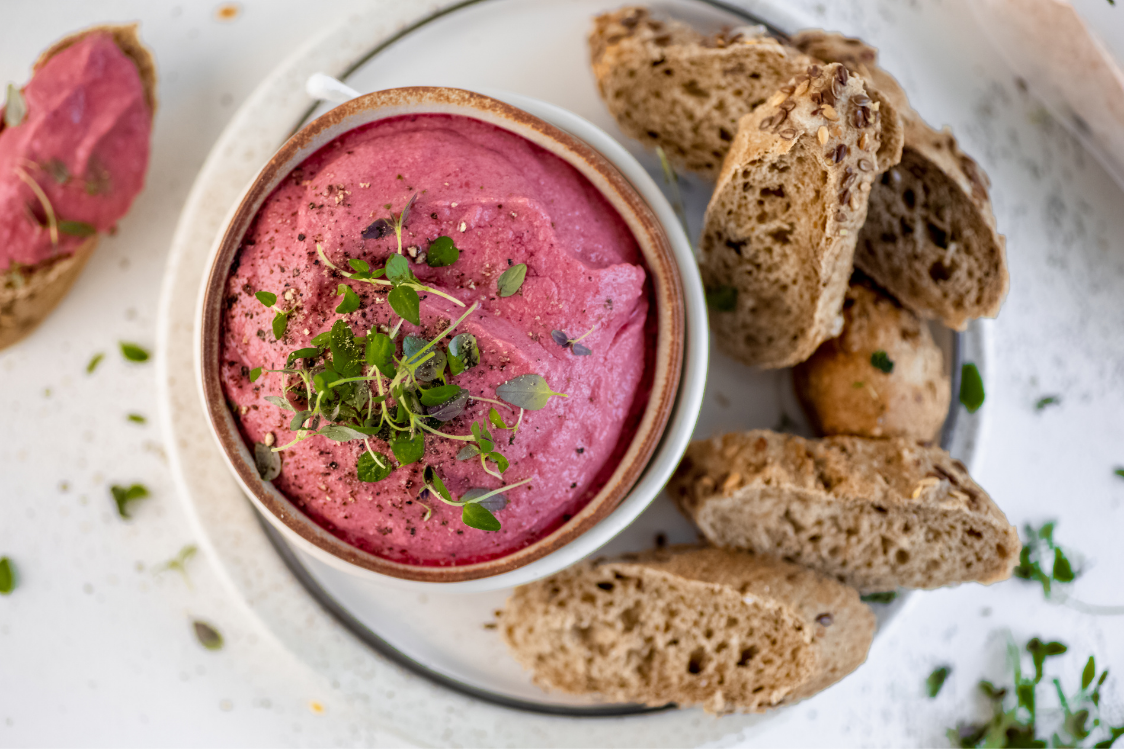
3. Eggs several ways
Eggs can easily be called a superfood. They are rich in protein, healthy fats, vitamins, minerals and many other bioactive substances. Therefore, you will definitely do well to include them in your diet on a regular basis. You don’t just have to stick to hard-boiled eggs. You can have an omelette one day, scrambled eggs the next. However, you can also prepare the less traditional egg in a glass or eggs Benedict. If you like to experiment, you can use them to make the aforementioned spreads, muffins, quiches or other interesting dishes.
Take inspiration from our recipes:
- Vegetable stew with egg
- Scrambled eggs with spinach
- Spinach omelette filled with mushrooms
- Breakfast eggs three different ways
4. Complex meal with meat
Meat is a great source of protein. Choose lower-fat varieties such as chicken, turkey, rabbit or lean beef. You can add a variety of side dishes such as potatoes, rice, quinoa or your favourite couscous. Feel free to jazz up the meat with a tasty marinade or light sauce.
Take inspiration from our recipes:
- Chicken with pesto and couscous
- Chicken Teriyaki
- Chicken pocket with spinach filling
- Asian-style chicken with quinoa
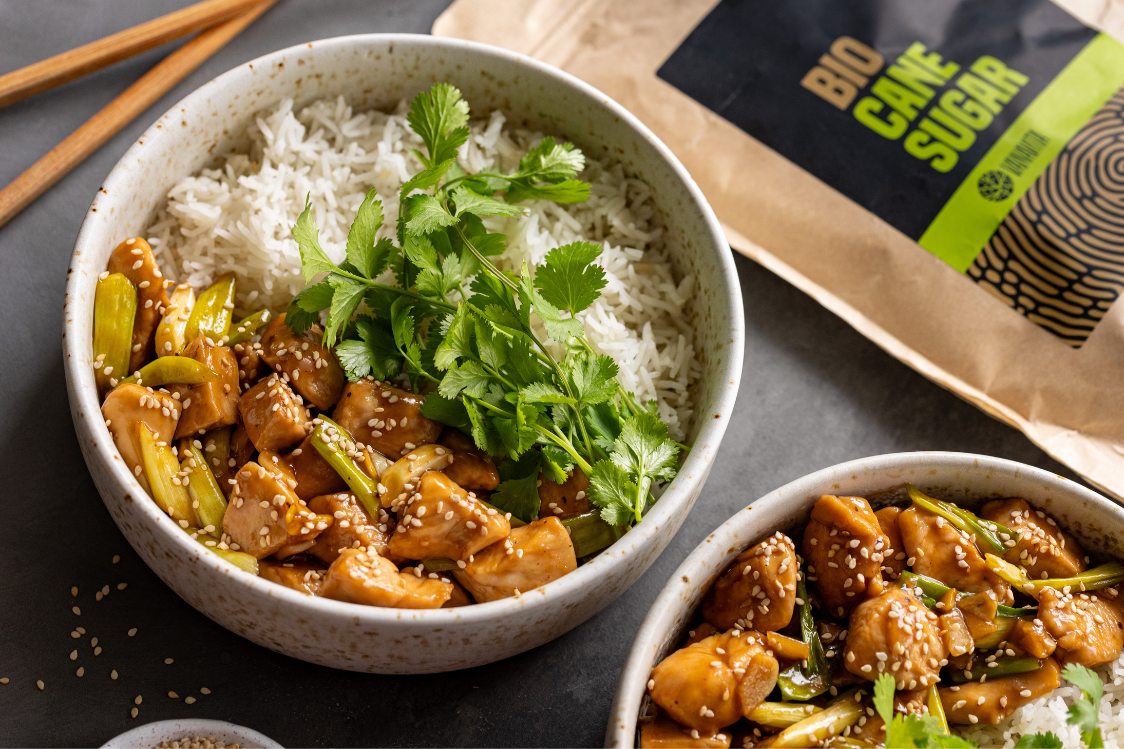
5. Complex meal with fish
Fish is a great source of protein, which is often missing from many of our diets. If you treat yourself to seafood, it will also provide you with healthy fats, including omega-3 fatty acids. Cod or tuna steak with potatoes is also a great diet food, which you will appreciate not only when losing weight. Fish should ideally be on the menu twice a week. When you don’t have time for any lengthy cooking, just take a packet of frozen vegetables, add canned tuna, yoghurt dressing, a piece of bread and a balanced meal is ready to go.
Take inspiration from our recipes:
6. Complex meal with a plant-based meat alternative
If you occasionally like to swap meat for a plant-based alternative or are vegan, you certainly don’t have to rely on just plain tofu. You can also include tempeh, seitan, soya cubes or robi in your diet. All of these can be simply prepared with a side dish, but they are also delicious in a variety of pasta sauces or as a quick filling for a wrap or tortilla.
Take inspiration from our recipes:
- Spaghetti with tempeh and tomato sauce
- Seitan with broccoli in Asian sauce
- Tortilla wrap with tofu and honey-mustard sauce
- Soba noodles with tofu and vegetables
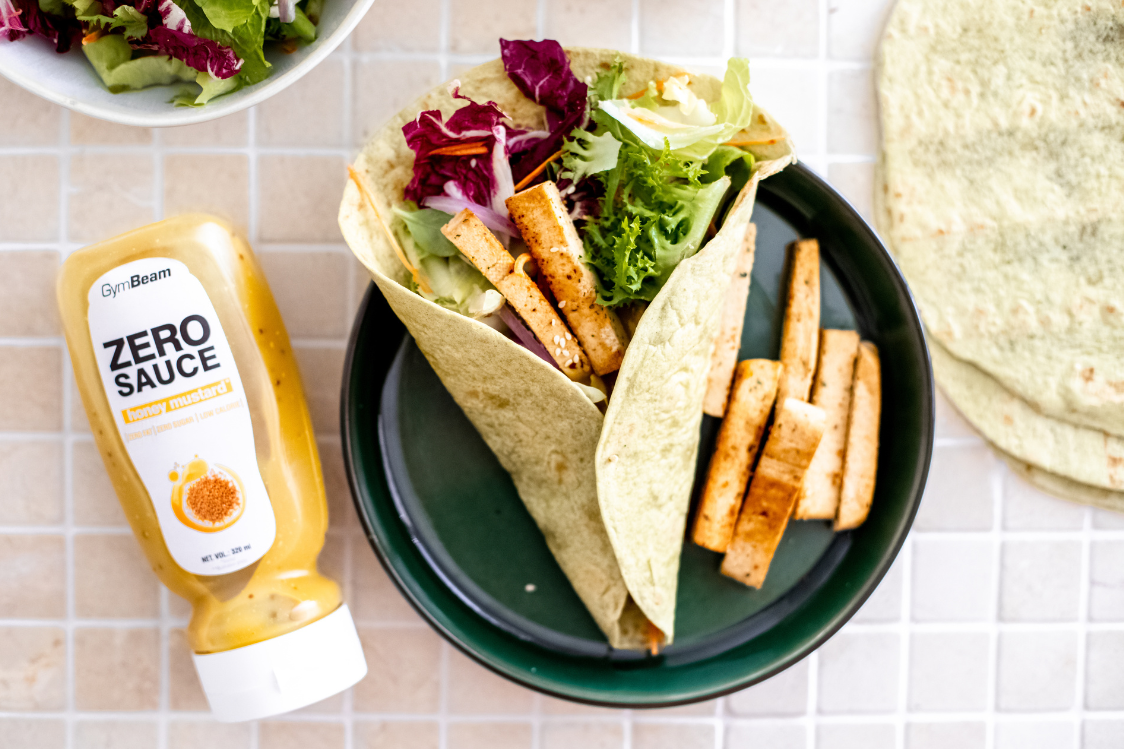
7. Porridge
Porridge of all kinds certainly doesn’t just belong on the breakfast menu. You can also enjoy sweet oatmeal, rice porridge or buckwheat porridge for dinner. After all, oatmeal or instant porridge, protein, fruit, nuts or seeds make up a complex meal packed with beneficial nutrients.
However, if a sweet dinner does not suit you, a savoury porridge is also an option. Have you tried it? Simply mix grated cheese, mozzarella or cottage cheese into the cooked porridge. It’s just as convenient to add an egg sunny side up, a hard-boiled egg or canned tuna. The choice of ingredients is up to you. Finally, just season the dish with spices of your preference, add vegetables and you’re done.
Take inspiration from our recipes:
- Savoury oat porridge with lost egg
- No-cook gingerbread oatmeal porridge
- Quinoa porridge with apple, poppy seeds and cinnamon
- Quick post-workout porridge with a good serving of protein
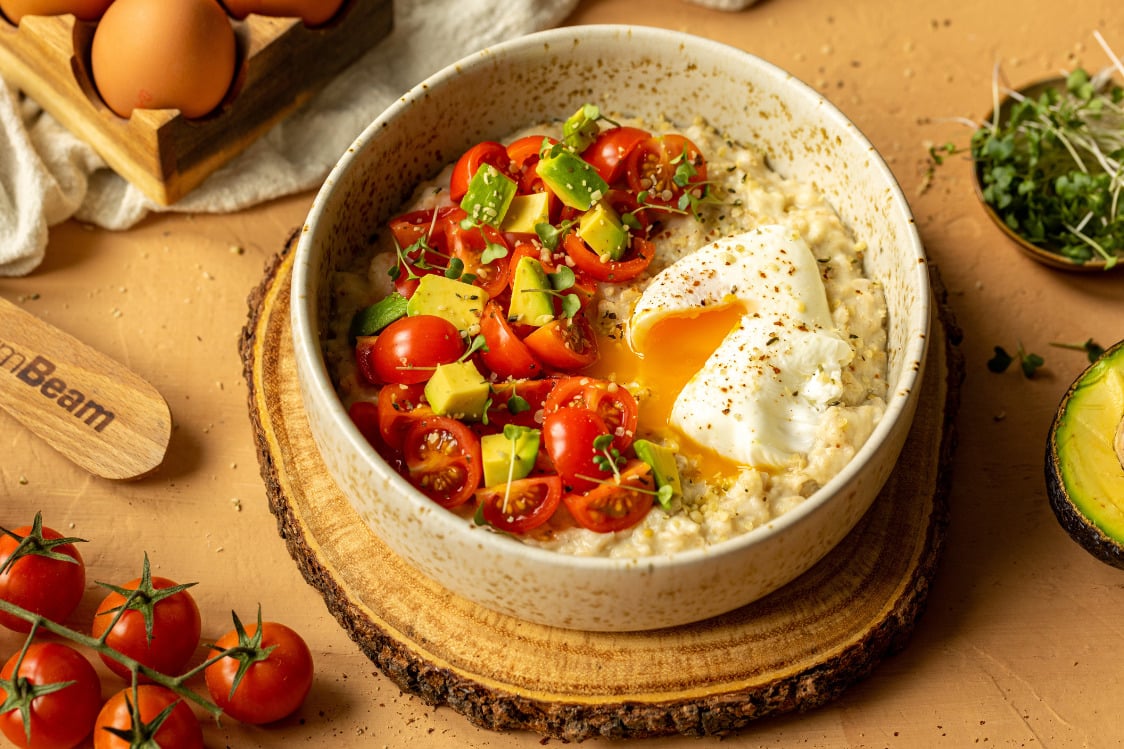
8. A sweet dinner
Sweet lovers can indulge in a sweet dinner without any problem even after an evening workout. Do you also have a craving for delicious pancakes, flapjacks or dumplings? Even such a sweet meal can be complex and nutritionally balanced. You will do one better if you improve it with, for example, wholegrain flour and add fruit or nuts. If you use almond or coconut flour, for example, they are suitable for a gluten-free diet. Don’t forget a source of protein in the form of cottage cheese, Greek yoghurt or skyr. Protein powder is a great addition to the batter. However, to avoid a sugar bomb, keep sugar intake to a minimum or replace it with sweeteners.
Take inspiration from our recipes:
- Baked pancakes with quark
- Three-ingredient banana pancakes
- Unleavened biscuits with poppy seeds
- Spelt pancakes with fruit and peanut butter
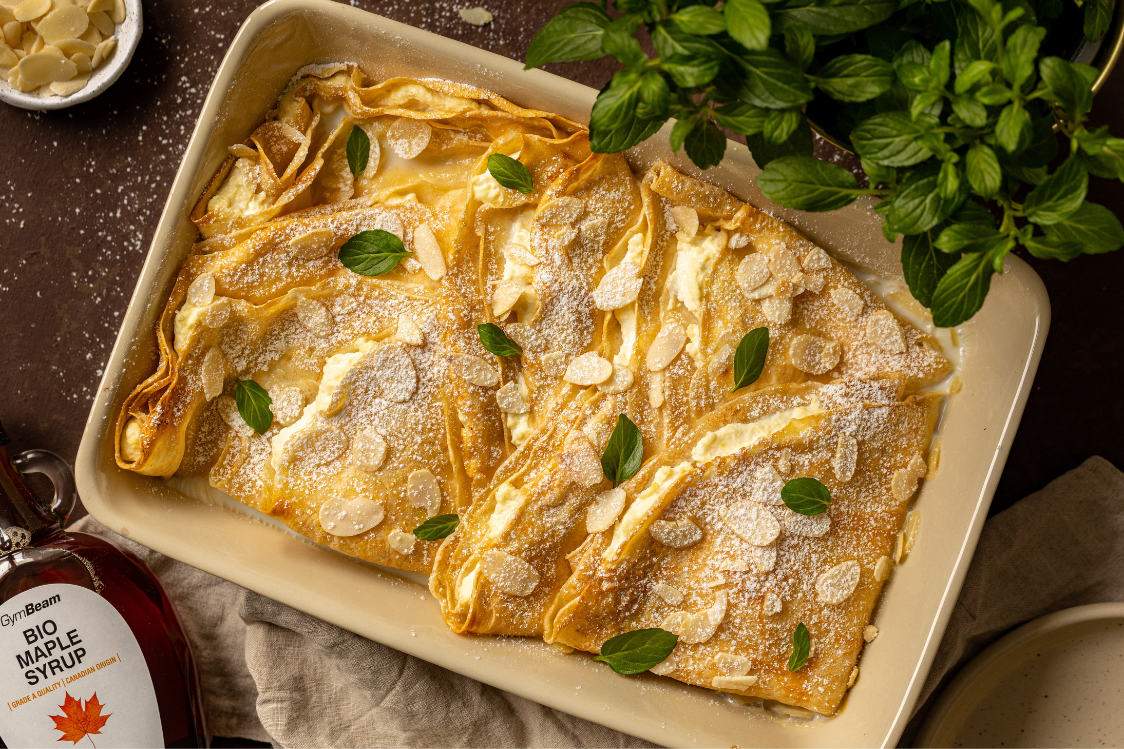
9. Quark, yoghurt or cottage
Need something quick and easy to eat? Then quark, skyr, cottage cheese or white yoghurt can save the day. Ideally, choose Greek, which has a higher protein content. When you supplement these dairy products with a source of complex carbohydrates (cereal, crispbread, etc.) and vegetables or fruit, you’re good to go. They’re perfect for a light, protein-rich meal that won’t weigh down your stomach before bed.
10. Healthy snacks for in the evening
A hunger crisis has arrived and you don’t have time to prepare even the quickest meal? Even then, all is not lost. You can always reach for ready-made snacks to stash in the pantry just in case. This isn’t an option that’s ideal to choose every day, but as a lifesaver, it will suffice. In these cases, you can reach for the following snacks.
- protein bar, protein cookie, protein flapjack or for example, dried meat.
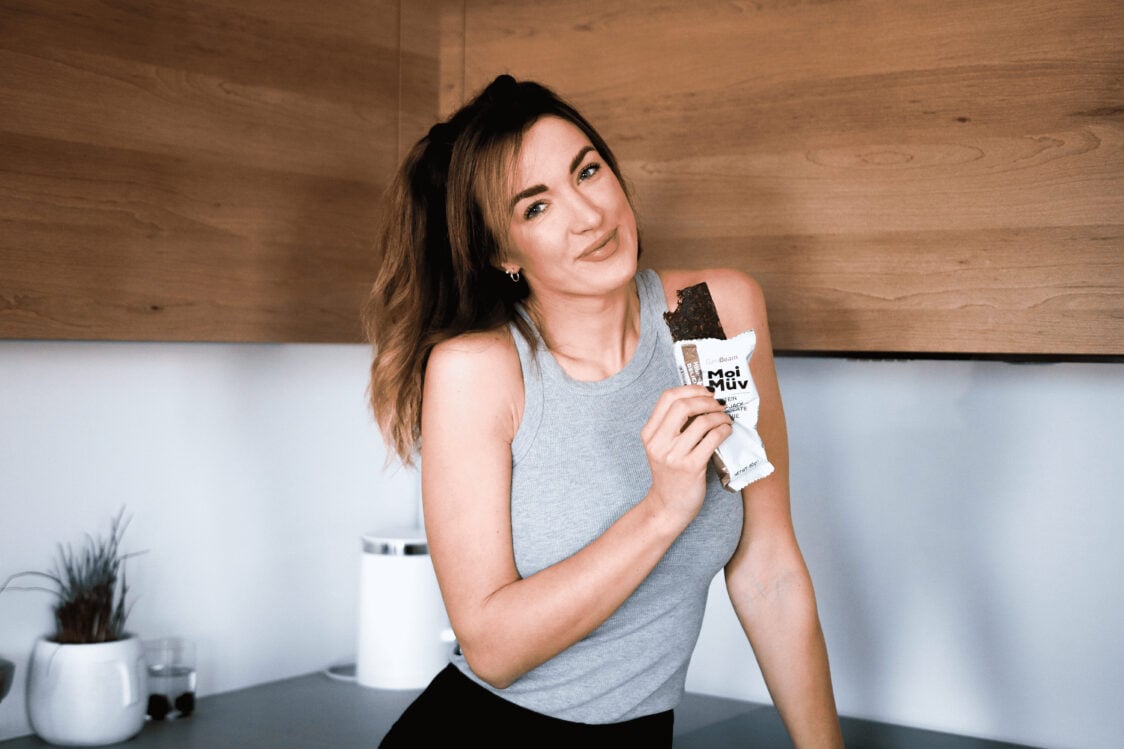
What foods are not suitable after an evening workout?
After an evening workout, you should particularly avoid nutritionally unbalanced meals, which are typically high in sugar and fat. On the contrary, they are often poor in protein. What is an example of this?
- confectionery, cakes
- classic recipes for sweet dishes such as flapjacks or pancakes with jam or Nutella, which are full of sugar and often lack protein
- dishes heavy in sauce
- fatty meat
- fried dishes
- pizza
Which supplements are suitable after an evening workout?
- Whey protein is a source of high quality and well-absorbed protein.
- Plant-based proteins are a great source of protein for vegans and those who prefer a plant-based diet.
- Overnight proteins also contain casein, which is digested more slowly and releases amino acids into the body gradually. This supplies the muscles with building material for almost the entire sleep period.
- BCAA or EAA contain free amino acids that can be used immediately by the muscles.
- Gainer also contains carbohydrates and other nutrients, making it a supplement with a comprehensive nutritional profile. You’d do well to choose complex products such as FueGain, which are not just a source of energy, but are a balanced all-in-one blend.
- Creatine can help with recovery and with improving strength and speed performance.
What should you remember?
After reading this article, you will know that you can reward yourself for your next workout with a tasty and nutritious dinner. After all, post-workout food is an important part of progress, both in losing weight and building muscle. It is important for the recovery of muscles damaged by working out, and their overall regeneration, and it also plays an important role in the growth of muscle mass. Of course, in order to fulfil these roles, your diet should not lack sufficient protein. Next, add complex carbohydrates, fibre, some healthy fats and adjust the serving to the time of your going to sleep. Bon appetit!
Did you learn anything new or find this article useful? We would be happy if you would share it with your friends and colleagues.
[1] ARAGON, A.A. - SCHOENFELD, B.J. Nutrient timing revisited: is there a post-exercise anabolic window? – https://jissn.biomedcentral.com/articles/10.1186/1550-2783-10-5
[2] CSCS, R.A., MS, MA, RD, RYT All About Post-Workout Nutrition. – https://www.precisionnutrition.com/about-post-workout-nutrition
[3] HELMS, E.R. et al. Evidence-based recommendations for natural bodybuilding contest preparation: nutrition and supplementation. – https://pubmed.ncbi.nlm.nih.gov/24864135/
[4] RUIZ-CASTELLANO, C. et al. Achieving an Optimal Fat Loss Phase in Resistance-Trained Athletes: A Narrative Review. – https://www.mdpi.com/2072-6643/13/9/3255
[5] SCHOENFELD, B.J. et al. Pre- versus post-exercise protein intake has similar effects on muscular adaptations. – https://peerj.com/articles/2825/
[6] SCHOENFELD, B.J. et al. The effect of protein timing on muscle strength and hypertrophy: a meta-analysis. – https://jissn.biomedcentral.com/articles/10.1186/1550-2783-10-53
[7] Full article: International society of sports nutrition position stand: nutrient timing. – https://www.tandfonline.com/doi/full/10.1186/s12970-017-0189-4
[8] Nutrition and Athletic Performance. – https://journals.lww.com/acsm-msse/fulltext/2016/03000/nutrition_and_athletic_performance.25.aspx
[9] GOODMAN, B.E. Insights into digestion and absorption of major nutrients in humans. [https://pubmed.ncbi.nlm.nih.gov/20522896/g


Add a comment